
Hungarian postcard. no. 5668, ca. 1903-1908. Photo: [Lipot Strelisky]. Sári Fedák as the title character in the operetta 'Bob herceg' (Prince Bob / Duke Bob, 1902) by Jenő Huszka. The premiere took place on 20 December 1902 at the Népszínház theatre in Budapest. The libretto was written by Ferenc Martos and Károly Bakonyi. It was the author's first operetta and he was successful both at home and abroad. He thus opened the way to fame for other Hungarian authors (especially Viktor Jacobi and Emmerich Kálmán). The operetta was filmed in 1941 (director: László Kalmár). The play by Huszka was extremely popular, especially because of Fedak's performance. By February 1903 she had already done 50 performances with the play at the Népszínház.
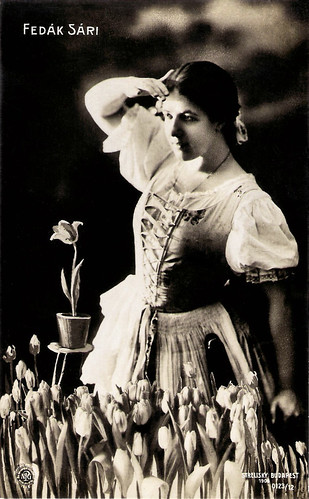
Hungarian postcard by NPG, no. 0123/12,1906. Photo: Strelisky, Budapest.

Hungarian postcard by NPG, no. 0117/6, 1906. Sári Fedák in the stage operetta 'Leányka' at the Népszínház (People's Theatre), Budapest.

Hungarian postcard by Törvényesen Védve, no. Budapest, no. 376/13. Photo: Strelisky, Budapest. Sári Fédak in the stage play 'Janos Vitéz'. 'Janos Vitéz' (John the Valiant) was a musical play by Pongrác Kacsóh in three acts. The premiere took place on 18 November 1904. The overwhelming success surprised even its creators. The audience cheered and laughed. During Bagó's movingly beautiful song, even tears were shed. When the song was over, the audience demanded a reprise. It took a while, because Mihály Papp, who played Bagó, had tears streaming down his face, the conductor József Konti was searching for his handkerchief, and even the composer Pongrác Kacsóh's eyes were watering. Sári Fedák recalled the premiere as her greatest success, in which the audience played a huge part.

Hungarian postcard by Törvényesen Védve, Budapest, no. 376/14. Photo: Strelisky, Budapest. Sári Fédak in the stage play 'Janos Vitéz'. Sent by mail in 1905.

Hungarian postcard by NPG. Photo: Strelisky, Budapest. Sári Fedák and Márton Rátkai in the stage operetta 'Leányvásár' (Girls for sale) which premiered in 1911 at the Király Színház (Royal Theatre in Budapest.
Angry crowds stormed her house
Sári Fedák or Fédak Sári was born in Beregszász, Hungary (now Berehove, Ukraine) in 1879. She studied acting with Szidi Rákosi until 1899 and began her career with the Magyar Színház theatre company. From 1900, she played in Pozsony (now Bratislava), and in several theatres in Budapest.
In 1907, she was mixed up in a scandal after the suicide of the famous playwright Paul Widor. According to an article in The Los Angeles Herald, angry crowds stormed her house and threatened her with death if she fell into their hands. Fedák was the well-paid star in a disastrous stage production of Widor, which ruined him and caused his suicide. Sári left Hungary and conquered Berlin in 1908, Vienna in 1909, and London and Paris in 1910. When she returned to Budapest the public welcomed her back.
In 1912, she made her film debut in the short comedy Gazdag ember kabátja/Rich man’s coat (Andor K. Kovács, 1912) based on a story by the famous Hungarian playwright and novelist Ferenc Molnár. The following year, she co-starred with Alfréd Deésy in Rablélek (1913), directed by Mihály Kertész who later became the famous Hollywood director Michael Curtiz.
In Márta (Ödön Uher ifj., 1913), she co-starred with Várkonyi Mihály, who became internationally known as Victor Varconi. Another silent film was Három hét/Three Weeks (Márton Garas, 1917), based on a novel by Elinor Glyn.
Following World War I, she spoke out against the Austro-Hungarian monarchy. In 1919, during the short run of the Hungarian Soviet Republic, she agitated for joining the Red Army. After the fall of the Republic, Fedák fled to Vienna but was captured and held in prison at Wiener Neustadt for a short time. As a supporter of the Republic, she could only play in Vienna from 1920-1921. She made appearances in Berlin and Paris in 1921 and 1925. In 1923, she became a member of the Fővárosi Operettszínház theatre.

Hungarian postcard. Photo: Strelisky, Budapest. Sent by mail in 1903.
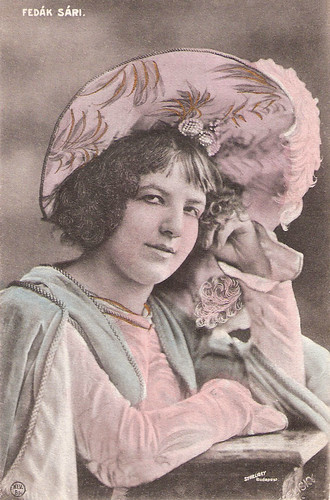
Hungarian postcard by KIV, Budapest. Photo: Strelisky, Budapest.
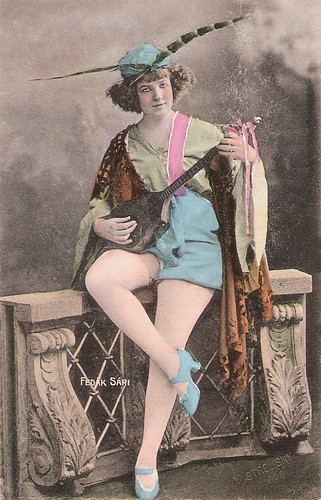
Hungarian postcard by S.J., Budapest. Photo: Strelisky, Budapest.

Hungarian postcard by KIV, Budapest. Photo: Strelisky, Budapest.

Hungarian postcard.

Hungarian postcard. Photo: Miklos Labori, Budapest. Sári Fedák and Jenö Törzs in the play 'Hotel Imperial' (1917), written by Lajos Bíró, at the Magyar Shinhaz (Hungarian Theatre).
Intimate relationships with 42 gentlemen
In 1922 Sári Fedák married Ferenc Molnár, after a six-year relationship. The couple divorced in 1925 or 1926 after he reportedly had accused her of intimate relationships with 42 gentlemen, and she had replied in kind with a list of 142 ladies who were said to have received his favours.
In 1927 there was another scandal when Fedák was sued by rival actress Vilma Banky. Fedák would have called her ‘that little lowdown Budapest cat’. Time magazine published a report of the trial including a description of Fedák’s entrance in the courtroom "clad in a black gown tight as a snake skin, looking perhaps half her 43 years". The court dismissed the case.
After the introduction of sound film, she made her come back to the cinema with Iza néni/Miss Iza (Székely István a.k.a. Steve Sekely, 1933) opposite Pál Jávor. In 1934, she toured several American cities. She used her American experiences for the script of Mámi (Vaszari János a.k.a. Johann von Vásáry, 1937) in which she played the title figure, a Hungarian woman returning from Texas. The success lead to other films like Az örök titok/The Eternal Secret (István György, 1938), Érik a búzakalász/The Wheat Ripens (Béla Gaál, 1939) and Bob herceg/Prince Bob (László Kalmár, 1941).
Starting in 1940, she was the leading actress in the Új Magyar Színház theatre. In 1944, working at the Donausender radio station in Vienna, she rallied Hungary to continue the fight in World War II on the side of Nazi Germany. For this act, she was sentenced to eight months in prison after the war, and she was banned from playing in theatres for three years. The court order broke her career: she never appeared on stage again.
After being released from prison, she moved to Nyáregyháza, retiring from active life. Sári Fedák died in 1955 in Budapest, Hungary, aged 75, and was interred in Budapest's Farkasréti Cemetery.

Hungarian postcard. Photo: Alexy, Budapest, 1914. Left to right: Frida Gombaszögi, Sári Fedák, Mari Jászai, [Szidi] Rákosi, Gyula Hegedüs, Ilona Szoyer, [Elza] Szamosi, Vilma Medgyaszai, and Erzsi Sándor.

Hungarian postcard by MRT, Budapest, no. 2. Photo: Strelisky, Budapest, 1917. Sári Fédak in A szeretö/The lover (Márton Garas, 1918).
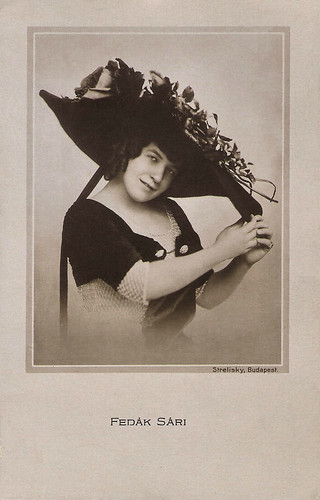
Hungarian postcard by Kiadja Reinitz Jòzsef, Budapest. Photo: Strelisky, Budapest.

Hungarian postcard. Photo: Miklós Labori, Budapest.
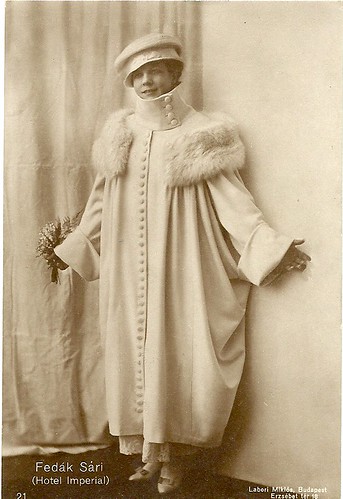
Hungarian postcard, no. 21. Photo: Miklós Labori, Budapest. Collection: Didier Hanson.

Vintage Hungarian postcard. Photo by Miklós Labori, Budapest. Sári Fedák as Anna in the play 'Hotel Imperial' (1917), written by Lajos Bíró, at the Magyar Shinhaz (Hungarian Theatre).
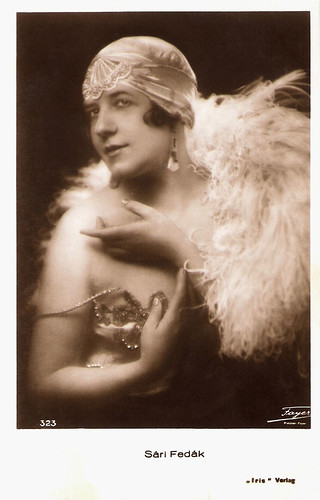
Austrian postcard by Iris Verlag, no. 323. Photo: Fayer.
Sources: Los Angeles Herald, Magyar Színházmüveszeti Lexikon (Hungarian), Wikipedia and IMDb.
This post was last updated on 4 March 2024.
No comments:
Post a Comment